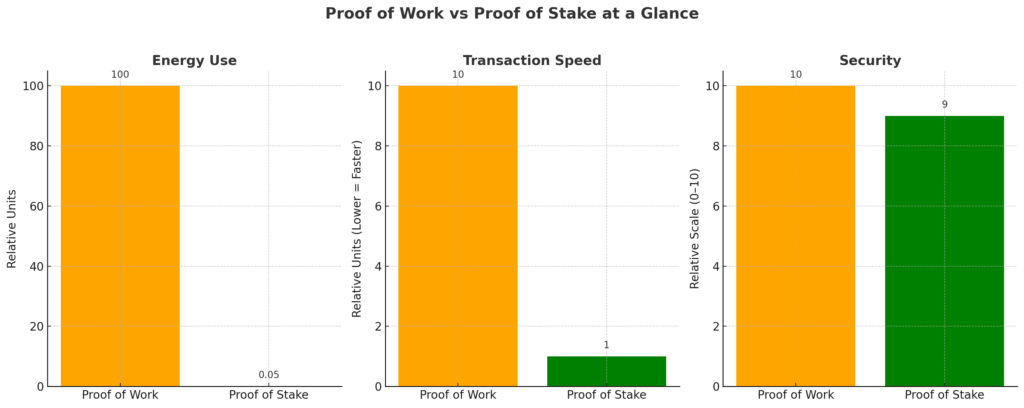The Problem Nobody Talks About
Every time you hear about blockchain, someone eventually throws these terms at you: Proof of Work (PoW) and Proof of Stake (PoS). And if you’re not a developer, they sound like two different martial arts styles. Proof of What? Proof of Who?
The truth is, these are just two different ways blockchains decide who gets to add the next block. Think of it as the referee system that keeps everyone honest.
Let’s break it down—without the jargon.
Think of It Like This: Two Ways to Run a Competition 🏆
Proof of Work: The Marathon
Imagine 1,000 runners sprinting to solve a puzzle. Only one wins the prize, but everyone else still wasted energy. That’s Bitcoin. Secure, but energy-heavy.
Proof of Stake: The Raffle
Instead of running, you buy raffle tickets by staking your crypto. The more tickets you have, the higher your chance of being chosen to validate the block. It’s fairer on energy—like picking a name out of a hat.
The Solution: How They Work in Practice
| Proof of Work (PoW) | Proof of Stake (PoS) |
| Computers compete to solve complex puzzles. Winner adds the block and gets rewarded. | Validators “stake” coins as collateral. System randomly chooses one to validate. |
| Pros: Very secure, proven (Bitcoin). | Pros: Uses 99.95% less energy, faster transactions, more scalable. |
| Cons: Massive energy use, slower transactions. | Cons: Critics say it can favor the wealthy (the more you stake, the higher your chance to win). |
Real Examples That Actually Matter
- Bitcoin → Runs on Proof of Work. That’s why it’s super secure, but also super energy-hungry.
- Ethereum → Switched from PoW to PoS in 2022. Energy use dropped by 99.95%, while keeping security strong.
- Cardano, Solana, Polygon → All built on Proof of Stake. That’s why they’re often marketed as greener, faster blockchains.
What You Can Do Today
- If you value security first → Learn how Bitcoin’s PoW works and why it’s trusted as “digital gold.”
- If you value eco-friendliness and speed → Explore PoS networks like Ethereum, Solana, or Polygon.
- Test it yourself → Send a transaction on Bitcoin (can take 10+ minutes) vs. Polygon (usually seconds).
Reality Check
- PoW isn’t “bad”—it’s the foundation of blockchain security. But it’s energy-hungry.
- PoS isn’t “perfect”—it still faces governance and fairness debates.
- Both exist for a reason: one prioritizes unbreakable security, the other prioritizes efficiency and scale.
TL;DR

- Proof of Work = Marathon. Secure but energy-heavy. (Bitcoin)
- Proof of Stake = Raffle. Efficient, eco-friendly, scalable. (Ethereum, Solana, Cardano)
Both are ways for blockchains to agree on what’s true. It’s not about which is “better,” but which trade-offs you’re comfortable with.
Next Step: Curious about the risks beyond scams? Read our article “Risks of Cypto Scams ” to see what could go wrong even in secure systems.
